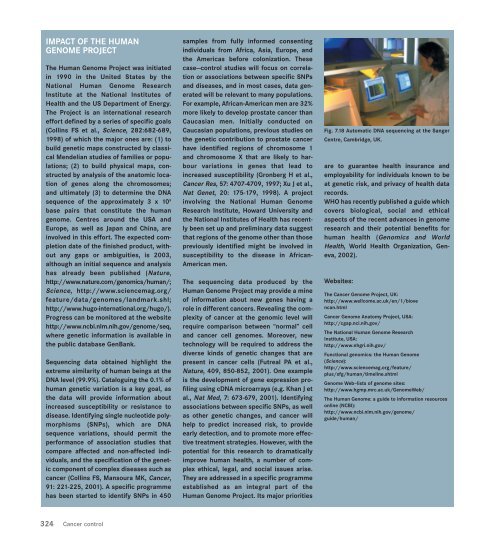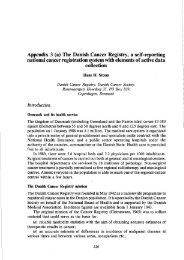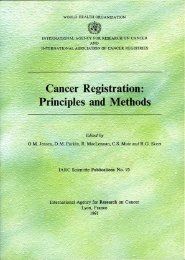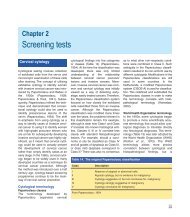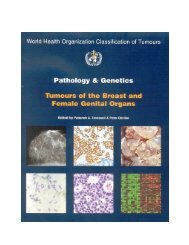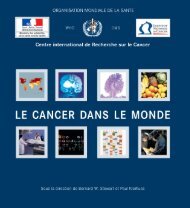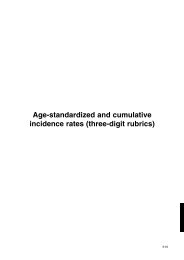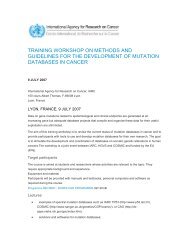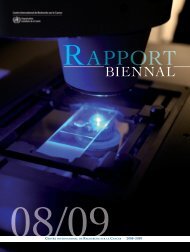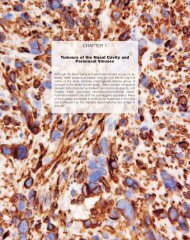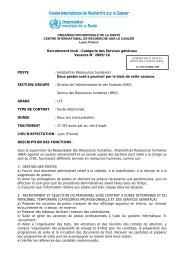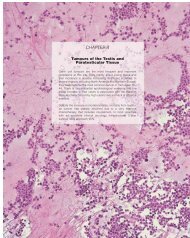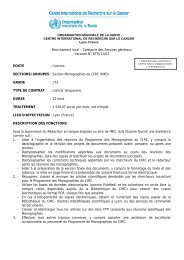world cancer report - iarc
world cancer report - iarc
world cancer report - iarc
Create successful ePaper yourself
Turn your PDF publications into a flip-book with our unique Google optimized e-Paper software.
IMPACT OF THE HUMAN<br />
GENOME PROJECT<br />
The Human Genome Project was initiated<br />
in 1990 in the United States by the<br />
National Human Genome Research<br />
Institute at the National Institutes of<br />
Health and the US Department of Energy.<br />
The Project is an international research<br />
effort defined by a series of specific goals<br />
(Collins FS et al., Science, 282:682-689,<br />
1998) of which the major ones are: (1) to<br />
build genetic maps constructed by classical<br />
Mendelian studies of families or populations;<br />
(2) to build physical maps, constructed<br />
by analysis of the anatomic location<br />
of genes along the chromosomes;<br />
and ultimately (3) to determine the DNA<br />
sequence of the approximately 3 x 10 9<br />
base pairs that constitute the human<br />
genome. Centres around the USA and<br />
Europe, as well as Japan and China, are<br />
involved in this effort. The expected completion<br />
date of the finished product, without<br />
any gaps or ambiguities, is 2003,<br />
although an initial sequence and analysis<br />
has already been published (Nature,<br />
http://www.nature.com/genomics/human/;<br />
Science, http://www.sciencemag.org/<br />
feature/data/genomes/landmark.shl;<br />
http://www.hugo-international.org/hugo/).<br />
Progress can be monitored at the website<br />
http://www.ncbi.nlm.nih.gov/genome/seq,<br />
where genetic information is available in<br />
the public database GenBank.<br />
Sequencing data obtained highlight the<br />
extreme similarity of human beings at the<br />
DNA level (99.9%). Cataloguing the 0.1% of<br />
human genetic variation is a key goal, as<br />
the data will provide information about<br />
increased susceptibility or resistance to<br />
disease. Identifying single nucleotide polymorphisms<br />
(SNPs), which are DNA<br />
sequence variations, should permit the<br />
performance of association studies that<br />
compare affected and non-affected individuals,<br />
and the specification of the genetic<br />
component of complex diseases such as<br />
<strong>cancer</strong> (Collins FS, Mansoura MK, Cancer,<br />
91: 221-225, 2001). A specific programme<br />
has been started to identify SNPs in 450<br />
324 Cancer control<br />
samples from fully informed consenting<br />
individuals from Africa, Asia, Europe, and<br />
the Americas before colonization. These<br />
case—control studies will focus on correlation<br />
or associations between specific SNPs<br />
and diseases, and in most cases, data generated<br />
will be relevant to many populations.<br />
For example, African-American men are 32%<br />
more likely to develop prostate <strong>cancer</strong> than<br />
Caucasian men. Initially conducted on<br />
Caucasian populations, previous studies on<br />
the genetic contribution to prostate <strong>cancer</strong><br />
have identified regions of chromosome 1<br />
and chromosome X that are likely to harbour<br />
variations in genes that lead to<br />
increased susceptibility (Gronberg H et al.,<br />
Cancer Res, 57: 4707-4709, 1997; Xu J et al.,<br />
Nat Genet, 20: 175-179, 1998). A project<br />
involving the National Human Genome<br />
Research Institute, Howard University and<br />
the National Institutes of Health has recently<br />
been set up and preliminary data suggest<br />
that regions of the genome other than those<br />
previously identified might be involved in<br />
susceptibility to the disease in African-<br />
American men.<br />
The sequencing data produced by the<br />
Human Genome Project may provide a mine<br />
of information about new genes having a<br />
role in different <strong>cancer</strong>s. Revealing the complexity<br />
of <strong>cancer</strong> at the genomic level will<br />
require comparison between “normal” cell<br />
and <strong>cancer</strong> cell genomes. Moreover, new<br />
technology will be required to address the<br />
diverse kinds of genetic changes that are<br />
present in <strong>cancer</strong> cells (Futreal PA et al.,<br />
Nature, 409, 850-852, 2001). One example<br />
is the development of gene expression profiling<br />
using cDNA microarrays (e.g. Khan J et<br />
al., Nat Med, 7: 673-679, 2001). Identifying<br />
associations between specific SNPs, as well<br />
as other genetic changes, and <strong>cancer</strong> will<br />
help to predict increased risk, to provide<br />
early detection, and to promote more effective<br />
treatment strategies. However, with the<br />
potential for this research to dramatically<br />
improve human health, a number of complex<br />
ethical, legal, and social issues arise.<br />
They are addressed in a specific programme<br />
established as an integral part of the<br />
Human Genome Project. Its major priorities<br />
Fig. 7.18 Automatic DNA sequencing at the Sanger<br />
Centre, Cambridge, UK.<br />
are to guarantee health insurance and<br />
employability for individuals known to be<br />
at genetic risk, and privacy of health data<br />
records.<br />
WHO has recently published a guide which<br />
covers biological, social and ethical<br />
aspects of the recent advances in genome<br />
research and their potential benefits for<br />
human health (Genomics and World<br />
Health, World Health Organization, Geneva,<br />
2002).<br />
Websites:<br />
The Cancer Genome Project, UK:<br />
http://www.wellcome.ac.uk/en/1/biove<br />
ncan.html<br />
Cancer Genome Anatomy Project, USA:<br />
http://cgap.nci.nih.gov/<br />
The National Human Genome Research<br />
Institute, USA:<br />
http://www.nhgri.nih.gov/<br />
Functional genomics: the Human Genome<br />
(Science):<br />
http://www.sciencemag.org/feature/<br />
plus/sfg/human/timeline.shtml<br />
Genome Web–lists of genome sites:<br />
http://www.hgmp.mrc.ac.uk/GenomeWeb/<br />
The Human Genome: a guide to information resources<br />
online (NCBI):<br />
http://www.ncbi.nlm.nih.gov/genome/<br />
guide/human/


